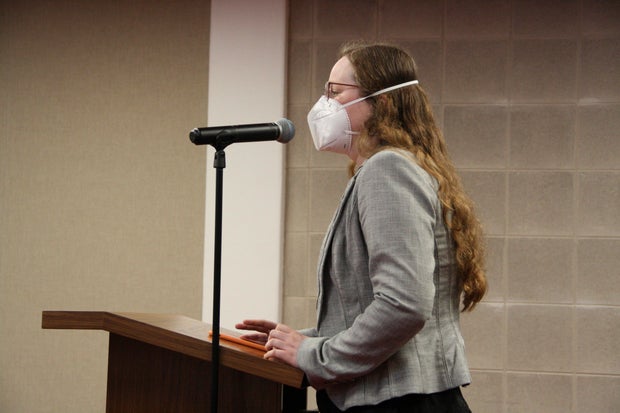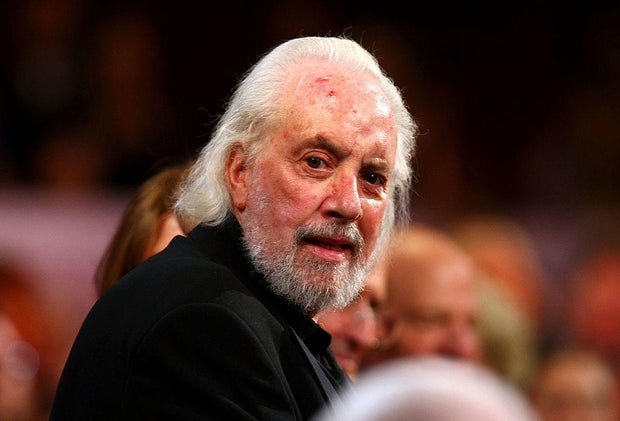CBS News
Bill to ban most public mask wearing, including for health reasons, advances in North Carolina

Republican lawmakers in North Carolina are pushing forward with their plan to repeal a pandemic-era law that allowed the wearing of masks in public for health reasons, a move spurred in part by demonstrations against the war in Gaza that have included masked protesters camped out on college campuses.
The legislation cleared the Senate on Wednesday in a 30-15 vote along party lines despite several attempts by state Senate Democrats to change the bill. The bill, which would raise penalties for someone who wears a mask while committing a crime, including arrested protesters, could still be altered as it heads back to the House.
Opponents of the bill say it risks the health of those masking for safety reasons. But those backing the legislation say it is a needed response to the demonstrations, including those at the University of North Carolina at Chapel Hill that escalated to police clashes and arrests.
The bill also further criminalizes the blockage of roads or emergency vehicles for a protest, which has occurred during pro-Palestinian demonstrations in Raleigh and Durham.
“It’s about time that the craziness is put, at least slowed down, if not put to a stop,” Wilson County Republican Sen. Buck Newton, who presented the bill, said on the Senate floor Wednesday.
Most of the pushback against the bill has centered around its removal of health and safety exemptions for wearing a mask in public. The health exemption was added at the start of the COVID-19 pandemic along largely bipartisan lines.
This strikethrough would return public masking rules to their pre-pandemic form, which were created in 1953 to address a different issue: limiting Ku Klux Klan activity in North Carolina, according to a 2012 book by Washington University in St. Louis sociology professor David Cunningham.
Since the pandemic, masks have become a partisan flashpoint — and Senate debate on if the law would make it illegal to mask for health purposes was no different.
Democratic lawmakers repeated their unease about how removing protections for people who choose to mask for their health could put immunocompromised North Carolinians at risk of breaking the law. Legislative staff said during a Tuesday committee that masking for health purposes would violate the law.
“You’re making careful people into criminals with this bill,” Democratic Sen. Natasha Marcus of Mecklenburg County said on the Senate floor. “It’s a bad law.”
Simone Hetherington, an immunocompromised person who spoke during Wednesday’s Senate Rules Committee, said masking is one of the only ways she can protect herself from illnesses and fears the law would prevent that practice.
Makiya Seminera / AP
“We live in different times and I do receive harassment,” Hetherington said about her mask wearing. “It only takes one bad actor.”
But Republican legislators continued to express doubt that someone would get in legal trouble for masking because of health concerns, saying law enforcement and prosecutors would use discretion on whether to charge someone. Newton said the bill focuses on criminalizing masks only for the purpose of concealing one’s identity.
“I smell politics on the other side of the aisle when they’re scaring people to death about a bill that is only going to criminalize people who are trying to hide their identity so they can do something wrong,” Newton said.
Three Senate Democrats proposed amendments to keep the health exemption and exclude hate groups from masking, but Senate Republicans used a procedural mechanism to block them without going up for a vote.
Future changes to the bill could be a possibility, but it would ultimately be up to the House, Newton told reporters after the vote. Robeson County Republican Sen. Danny Britt also said during an earlier committee that he anticipated “some tweaking.”
House Rules Committee Chairman Destin Hall, a Caldwell County House Republican, told reporters before the Senate vote that the House planned to “take a look at it” but members wanted to clamp down on people who wear masks while committing crimes.
The masking bill will likely move through a few committees before hitting the House floor, which could take one or two weeks, Hall said.
CBS News
7/2: CBS Evening News – CBS News

Watch CBS News
Be the first to know
Get browser notifications for breaking news, live events, and exclusive reporting.
CBS News
Robert Towne, legendary Hollywood screenwriter of “Chinatown,” dies at 89

Robert Towne, the Oscar-winning screenplay writer of “Shampoo,” “The Last Detail” and other acclaimed films whose work on “Chinatown” became a model of the art form and helped define the jaded allure of his native Los Angeles, has died. He was 89.
Towne “passed away peacefully surrounded by his loving family” Monday at his home in Los Angeles, his publicist Carri McClure, told CBS News in a statement. She did not provide a cause of death.
In an industry which gave birth to rueful jokes about the writer’s status, Towne for a time held prestige comparable to the actors and directors he worked with. Through his friendships with two of the biggest stars of the 1960s and ’70s, Warren Beatty and Jack Nicholson, he wrote or co-wrote some of the signature films of an era when artists held an unusual level of creative control. The rare “auteur” among screen writers, Towne managed to bring a highly personal and influential vision of Los Angeles onto the screen.
Alberto E. Rodriguez/Getty Images for AFI
“It’s a city that’s so illusory,” Towne told The Associated Press in a 2006 interview. “It’s the westernmost west of America. It’s a sort of place of last resort. It’s a place where, in a word, people go to make their dreams come true. And they’re forever disappointed.”
Recognizable around Hollywood for his high forehead and full beard, Towne won an Academy Award for “Chinatown” and was nominated three other times, for “The Last Detail,” “Shampoo” and “Greystoke.” In 1997, he received a lifetime achievement award from the Writers Guild of America.
“His life, like the characters he created, was incisive, iconoclastic and entirely (original),” said “Shampoo” actor Lee Grant on X.
Towne was born Robert Bertram Schwartz in Los Angeles and moved to San Pedro after his father’s business, a dress shop, closed down because of the Great Depression. His father changed the family name to Towne.
Towne’s success came after a long stretch of working in television, including “The Man from U.N.C.L.E” and “The Lloyd Bridges Show,” and on low-budget movies for “B” producer Roger Corman. In a classic show business story, he owed his breakthrough in part to his psychiatrist, through whom he met Beatty, a fellow patient. As Beatty worked on “Bonnie and Clyde,” he brought in Towne for revisions of the Robert Benton-David Newman script and had him on the set while the movie was filmed in Texas.
Towne’s contributions were uncredited for “Bonnie and Clyde,” the landmark crime film released in 1967, and for years he was a favorite ghost writer. He helped out on “The Godfather,” “The Parallax View” and “Heaven Can Wait” among others and referred to himself as a “relief pitcher who could come in for an inning, not pitch the whole game.” But Towne was credited by name for Nicholson’s macho “The Last Detail” and Beatty’s sex comedy “Shampoo” and was immortalized by “Chinatown,” the 1974 thriller set during the Great Depression.
“Chinatown” was directed by Roman Polanski and starred Nicholson as J.J. “Jake” Gittes, a private detective asked to follow the husband of Evelyn Mulwray (played by Faye Dunaway). The husband is chief engineer of the Los Angeles Department of Water and Power and Gittes finds himself caught in a chaotic spiral of corruption and violence, embodied by Evelyn’s ruthless father, Noah Cross (John Huston).
Influenced by the fiction of Raymond Chandler, Towne resurrected the menace and mood of a classic Los Angeles film noir, but cast Gittes’ labyrinthine odyssey across a grander and more insidious portrait of Southern California. Clues accumulate into a timeless detective tale, and lead helplessly to tragedy, summed up by one of the most repeated lines in movie history, words of grim fatalism a devastated Gittes receives from his partner Lawrence Walsh (Joe Mantell): “Forget it, Jake, it’s Chinatown.”
The back story of “Chinatown” has itself become a kind of detective story, explored in producer Robert Evans’ memoir, “The Kid Stays in the Picture”; in Peter Biskind’s “East Riders, Raging Bulls,” a history of 1960s-1970s Hollywood, and in Sam Wasson’s “The Big Goodbye,” dedicated entirely to “Chinatown.” In “The Big Goodbye,” published in 2020, Wasson alleged that Towne was helped extensively by a ghost writer — former college roommate Edward Taylor. According to “The Big Goodbye,” for which Towne declined to be interviewed, Taylor did not ask for credit on the film because his “friendship with Robert” mattered more.
The studios assumed more power after the mid-1970s and Towne’s standing declined. His own efforts at directing, including “Personal Best” and “Tequila Sunrise,” had mixed results. “The Two Jakes,” the long-awaited sequel to “Chinatown,” was a commercial and critical disappointment when released in 1990 and led to a temporary estrangement between Towne and Nicholson.
Around the same time, he agreed to work on a movie far removed from the art-house aspirations of the ’70s, the Don Simpson-Jerry Bruckheimer production “Days of Thunder,” starring Tom Cruise as a race car driver and Robert Duvall as his crew chief. The 1990 movie was famously over budget and mostly panned, although its admirers include Quentin Tarantino and countless racing fans. And Towne’s script popularized an expression used by Duvall after Cruise complains another car slammed him: “He didn’t slam into you, he didn’t bump you, he didn’t nudge you. He rubbed you.
“And rubbin,′ son, is racin.'”
Towne later worked with Cruise on “The Firm” and the first two “Mission: Impossible” movies. His most recent film was “Ask the Dust,” a Los Angeles story he wrote and directed that came out in 2006. Towne was married twice, the second time to Luisa Gaule, and had two children. His brother, Roger Towne, also wrote screenplays, his credits include “The Natural.”
CBS News
Analyzing impact of Supreme Court’s Trump immunity decision

Watch CBS News
Be the first to know
Get browser notifications for breaking news, live events, and exclusive reporting.









